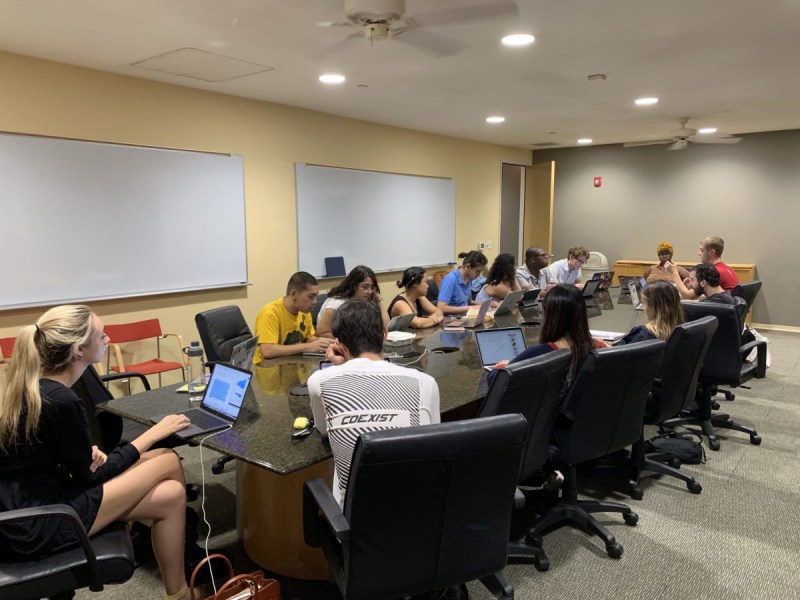Students responded positively to the curricular reform proposal to establish a core curriculum but were more hesitant about the proposal that recommends capping all majors at 95 units, according to a recently-released Associated Students of Stanford University (ASSU) report on student perspectives toward the proposals.
The report — which will be discussed at the Faculty Senate this Thursday — also expressed the Undergraduate Senate’s official endorsement of the proposals, and includes recommendations for potential amendments to the proposals based on student feedback. The ASSU analysis represents the aggregate feedback of approximately 70 undergraduates to a survey distributed to the entire student community.
According to ASSU Senator Jonathan Lipman ’21, who authored the report, student respondents expressed near-unanimous support for the proposal to standardize unit counts, although responses to the proposal to reduce unit counts on majors to no more than 95 units were more divided. The latter proposal is aimed at making unit-heavy majors more accessible to those who lack prerequisites and allowing students to explore more classes outside their major.
While some students said that scaling back unit counts could reduce stress and encourage greater academic freedom, others argued that reducing major size has no effect on the broader limiting factor of mandatory course sequences that only run once a year, which forces students to take mandatory sequences early or else miss out on a year of required classes.
“We agree that there is a real issue here,” wrote philosophy professor Lanier Anderson in a statement on behalf of the team of four faculty co-chairs that drafted the proposals. “There are some majors currently under the proposed unit cap which do have accessibility challenges because of this kind of issue.”
Anderson added that the proposal recommends that every major have an accessibility plan that outlines bottlenecks and that a special committee, which is currently being formed, reviews the central STEM prerequisite course structure.
Regarding the future of the major, students were also in support of having a required senior capstone, standardizing prerequisite classes and a designated major declaration week, according to the report.
The proposal to establish a core freshman-year curriculum was met with positive reception toward the concept, but doubt toward execution. While the proposal argues that a standardized core sequence will allow first-year students to explore the idea of a liberal arts education in an unfettered environment and foster a stronger intellectual culture on campus, the ASSU report points to significant student doubt over the core curriculum’s successful implementation.
French professor Dan Edelstein, who helped draft the proposals as co-chair alongside Anderson, acknowledged that recruiting faculty to teach the core courses and setting up a robust course review structure will be among the program’s key implementation challenges.
“No doubt we’ll try some things that look great on paper, but don’t work well in class,” Edelstein said. “That’s to be expected, so we want to have a structure in place that allows us to make changes fairly easily, and lets the faculty teaching the courses tweak and transform them over time.”
Some student respondents criticized the proposed core as being too humanities-centric and lacking in STEM, while others noted that the large lecture format could disincentivize attendance.
However, Edelstein believes this view stems from a common misconception among students that a “liberal education” is synonymous with the humanities, and added that “the core is not just humanistic,” but will also address technological issues, as well as ethical and political perspectives.
“Today, a liberal education is universally thought to entail a broad, well-rounded education, which necessarily incorporates STEM,” he said. “For us, a liberal education is a mindset (one that we contrast with instrumental or vocational education). It is the mindset you adopt when you study a subject, whether art history or chemical engineering, for its own sake, not just for some ulterior purpose.”
Still, many students responded positively toward the idea of a core curriculum broadly speaking, concluding that the success of the program will ultimately be determined by the details of its execution, which have yet to be solidified. According to ASSU President Erica Scott ’20, gaining student and faculty buy-in is among the primary challenges moving forward in the proposals.
“The success of these proposals hinges pretty heavily on implementation, and students and faculty need to be on board for effective implementation to occur,” she wrote in a statement to The Daily. “We expect that most faculty will agree that curricular changes need to be made since Stanford isn’t adequately living up to its ideal of a liberal arts education. However, we foresee some faculty members expressing skepticism that these proposed changes will actually fix the problems at hand.”
In response to the student feedback aggregated in its report, the Senate recommended several changes to the two faculty proposals on the first-year experience and future of the major. Among these include restructuring course sequences, redesigning the WAYS general education requirements and modifying the first-year experience proposal to include transfer students.
They also recommended that over the long term the University continue to explore solutions to mitigate an “extremely toxic” job recruiting process, centralize course planning into a single website and expand its pre-freshman year academic prep programs, including the Leland Scholars Program and Stanford Summer Engineering Academy.
The two proposals in question will be presented and discussed at the Faculty Senate on Thursday.
Contact Claire Wang at clwang32 ‘at’ stanford.edu.
This article has been corrected to note that student respondents to the ASSU survey expressed near-support for the proposal to standardize unit counts, not the proposal to cap the major at 95 units. It has also been corrected to reflect that students show broad support for the core curriculum and doubt towards unit reduction of the major, not the other way around. The Daily regrets these errors.
